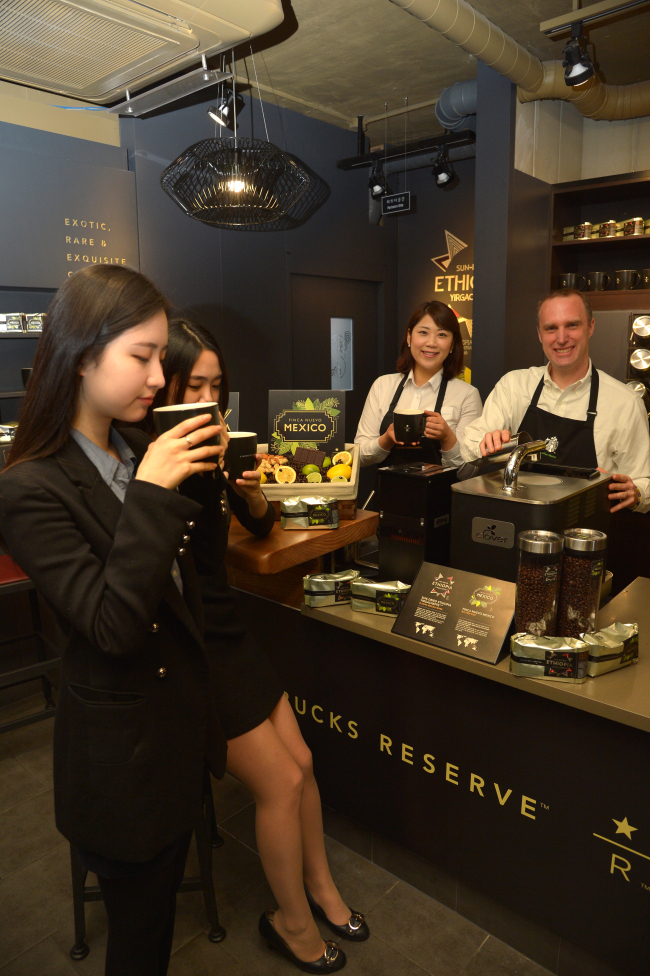Coffee chains go upscale to beat competition
Starbucks Reserve opens in Korea to offer taste of premium coffee
By Korea HeraldPublished : March 18, 2014 - 20:43
Competition in the high-end segment of the 1.6 trillion won ($1.5 billion) Korean coffee shop market may heat up as more and more coffee aficionados appear to be craving something extra special in their coffee.
While it remains to be seen whether the upscale trend will catch on in earnest, going premium is likely to offer new business opportunities for coffee shops that are seeing heavy competition, market observers say.
Starbucks Korea has become the latest and by far the most powerful contender with its launch of a gourmet coffee brand, Starbucks Reserve, on Tuesday.
Starbucks Reserve sells coffee for 6,000 won-7,000 won a cup, which is about 3,000 won higher than at a regular Starbucks. The coffee is more expensive because it is brewed through its signature Clover machine by baristas who have undergone official “coffee master” programs.
While it remains to be seen whether the upscale trend will catch on in earnest, going premium is likely to offer new business opportunities for coffee shops that are seeing heavy competition, market observers say.
Starbucks Korea has become the latest and by far the most powerful contender with its launch of a gourmet coffee brand, Starbucks Reserve, on Tuesday.
Starbucks Reserve sells coffee for 6,000 won-7,000 won a cup, which is about 3,000 won higher than at a regular Starbucks. The coffee is more expensive because it is brewed through its signature Clover machine by baristas who have undergone official “coffee master” programs.

Five Starbucks Reserve cafes ― in Apgujeong-dong, Sogong-dong, Jeokseon-dong and Itaewon-dong in Seoul, and Jeongja-dong in Gyeonggi Province ― have opened in Korea to join the 800 Reserve outlets worldwide.
The beans used for Reserve coffee will change every three or four months because only small amounts are imported. The inaugural coffee beans are Finca Nuevo Mexico and Sun-Dried Ethiopia.
“Only 1 in 1,000 cups of coffee might be the special coffee, special enough to be a Starbucks Reserve,” said Chris Gimbl, global brand manager of Starbucks Reserve. Gimbl noted that a maximum of only up to 15 pounds (6.8 kilograms) of coffee beans may be stored at a time at Starbucks Reserve cafes.
Market watchers suggest that the decision to go upscale stems from coffee makers’ desperate need to find a sweet spot amid fierce market competition. According to industry insiders, there are more than 15,000 coffee shops in the country.
“You can literally say that large streets are filled with coffee shops ranging from small names to powerhouses including Starbucks, Coffee Bean and Tea Leaf, Caffe Bene or Twosome Place,” said a 32-year-old named Jung, who used to run a Caffe Bene store in Seoul.
“Coffee has become such a routine part of Koreans’ lives, I can’t imagine the market growing any further,” he said, adding that going high-end is the only way to generate more growth.
Starbucks Korea remains upbeat about the future.
“The Korean coffee market won’t grow as explosively as it used to, but we are confident that it still will grow at least in the single-digit range, annually,” Starbucks Korea CEO and president Lee Seock-koo said Tuesday at the launching event of the Reserve brand.
Gimbl noted that it was natural for people to want premium coffees. It is a huge boom in the U.S., Japan and other countries, he said. “Instead of large-batch brewers, they want something that is made for them slowly and with great care,” he added.
Among the homegrown coffee brands, Tom n Toms in June 2013 opened The Calypso, an upscale cafe in Gangnam-gu, southern Seoul. It sells coffee made with premium beans from East Timor and Ethiopia at 7,000 won-10,500 won a cup.
CJ’s Twosome Place opened a premium cafe in the fashionable district of Garosugil in southern Seoul, where a cup of hand-drip black coffee is sold at around 5,500 won, which is slightly higher than at other outlets.
By Bae Ji-sook (baejisook@heraldcorp.com)
-
Articles by Korea Herald


















![[KH Explains] Hyundai's full hybrid edge to pay off amid slow transition to pure EVs](http://res.heraldm.com/phpwas/restmb_idxmake.php?idx=652&simg=/content/image/2024/04/18/20240418050645_0.jpg&u=20240418181020)

![[Today’s K-pop] Zico drops snippet of collaboration with Jennie](http://res.heraldm.com/phpwas/restmb_idxmake.php?idx=642&simg=/content/image/2024/04/18/20240418050702_0.jpg&u=)